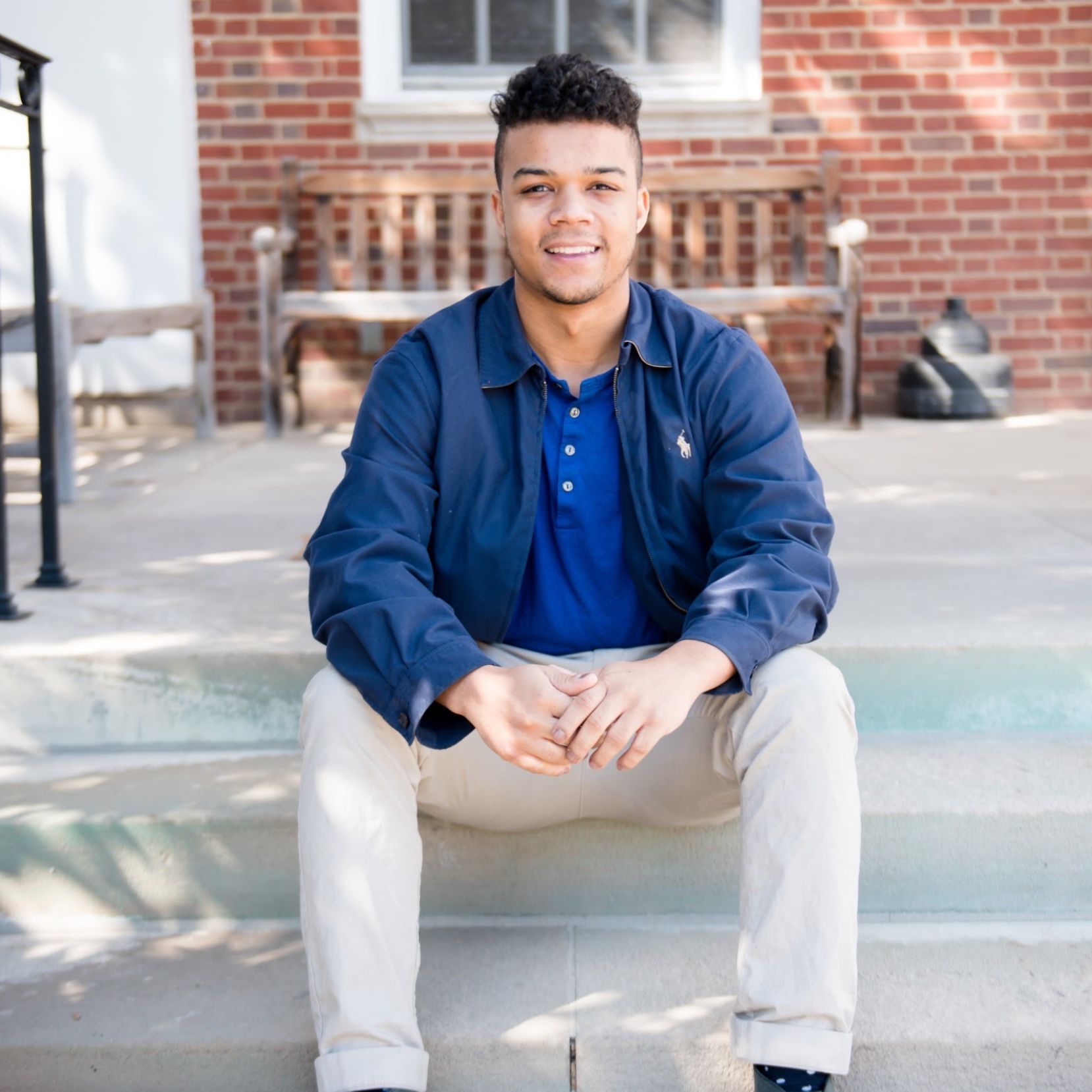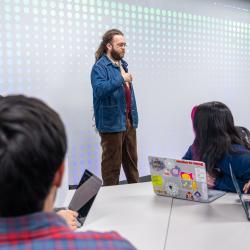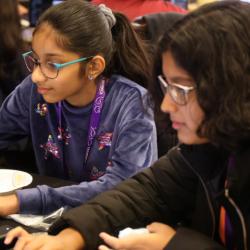Alumnus Jonathan Mevs Reflects on First Year of Teaching High School
My First Year of Teaching
By Jonathan Reed Mevs (B.S. ’18, computer science; M.A. ’19, education)
"You're a teacher?! Oh naw, I real live thought you were a student," she innocently stated as I motioned for the 12th graders to return to class following lunch.
"Ok, nice one. Let's get to class now," I chuckled in response. Being slightly vertically challenged, with a beard that can't quite fully connect yet, it wasn't a surprise to me that I'd be mistaken as a student.
"No, like I really thought you were a student. You were in uniform on the first day of school."
 Then it dawned on me. I wore precisely the student uniform on the first day of school. Blue polo shirt, khakis, and boat shoes. As we walked out of the cafeteria, I was informed that the talk among the students during the first week was, "Who is this new kid and why is he introducing himself to everyone?"
Then it dawned on me. I wore precisely the student uniform on the first day of school. Blue polo shirt, khakis, and boat shoes. As we walked out of the cafeteria, I was informed that the talk among the students during the first week was, "Who is this new kid and why is he introducing himself to everyone?"
Amongst my colleagues, I was just that. As the youngest on staff, I had a lot to learn and was grateful to be welcomed by such a supporting, tight-knit staff. I was ecstatic about the opportunity to work with four (yes, four!) other computer science teachers on a team serving students in all grades of high school. My teaching load consisted of Python programming to half of the twelfth graders and an introductory computer science course to a quarter of the ninth graders. Approximately 75 students in total. Quicker than I knew, my first year of teaching in the nation's capital began.
Me Versus Me
During the fall of the 2019-2020 school year, I was struggling with imposter syndrome. According to Merriam-Webster, "Impostor syndrome is a psychological condition that is characterized by persistent doubt concerning one's abilities or accomplishments accompanied by the fear of being exposed as a fraud despite evidence of one's ongoing success. I felt like a fraud. I wasn't a teacher, in fact, I knew nothing about teaching. I didn't know how to manage a classroom, develop cohesive lesson plans, and establish deep, supporting rapport with a variety of students. Observing the ease with which my colleagues were able to design precise, objective focused lessons, manage classes that were larger, and more animated than mine, as well as uphold deep relationships with students was a frustrating experience.
I was my own worst enemy. My growth as a teacher was stunted as I became a victim to thoughts of anxiety and uncertainty. Instead of using time outside of the workplace to rest, and restore, I'd drown in spiraling thoughts of insufficiency, failure, and fraud. Self-care, relationships, and my well-being suffered.
To my eventual discovery, I was doing each and every one of these things that I thought only my experienced coworkers were capable of. Students gathered into my room after school and during free periods. School leaders and visitors poked their heads into my room to see students engaging in fruitful computer science lessons. Other teachers in the building praised the work I was doing as a first-year teacher. My freshmen students would show off their computer science skills to other teachers and students in the building. The work I was doing in that building was appreciated, despite the fact I couldn't initially see it myself.
Every first-year teacher should be prepared for these feelings of inadequacy. What eventually helped me cope was remembering that I was hired for a reason. Additionally, as a general rule of thumb, be sure to focus on the positives! It is all too easy to look at a class average of 62% on a quiz, feel like a failure, and let that dominate your thoughts.
It is the duty of a teacher to actively reflect on how to raise assessment scores. However, be careful not to do so in a self-deprecating manner. That is going to do no one good. Remembering the positives, as you revisit what didn't work for your students, allows you to revise, redesign, and keep moving forward with a clear mind.
The Year Ahead
Just when I finally started getting the hang of things, our school had to go remote because of the COVID-19 outbreak. After finally establishing routines both inside and outside of the classroom, everyone's lives simultaneously fell to shambles. I was back at square one. At least, however, the whole education realm was back at square one together.
Remote learning was a special time for me because I finally got to see some concrete results from a year of hard work. During this time, I had some of the biggest wins of my first year teaching. Two students in my Python class needed to earn a 90% in order to pass the class, and graduate high school in their fourth quarter. These students showed me an inspiring amount of effort, hustle, and tenacity. For four days a week, they would log onto the Google Hangouts link to work through challenging Python code, exercises, and assessments with me. As a first-year teacher, I felt the near palpable extrinsic pressure to make sure my class wasn't the reason a student didn't graduate. At the same time, I was grappling with the intrinsic pressure to make sure grades were earned, not given, and that students were genuinely learning some programming in the process. I'll never forget each of their ear-to-ear virtual smiles along with their mother's when I notified them that their hard work earned them a 90% for the quarter.
In my freshman course, I experienced first hand just how much a student can grow in a year. This student was an English language learner who started the year being only able to ask for help through Google Translate. He earned a 'D' for the first quarter. However, this was really just the motivation he needed as his grade progression throughout the year went D, C, B and finally ending the school year with an A in Computer Science. Though I didn't see his smile, I heard it through his voice, as he offered a last "Thanks, Mister," and signed off.
Teachers in America are often given the short end of the stick. Whether it be inadequate funding, mismanaged schools, and districts, or now being forced to choose between one's health and one's job, there are often too many barriers in the way of a teacher doing what they love to do, teach. There is no other job that allows you to have a first-hand impact on molding the future. Regardless of a global pandemic, a start-up charter school, or imposter syndrome, the joy of teaching can't be taken away.
###
Reprinted from the Terrapin Teachers newsletter.







